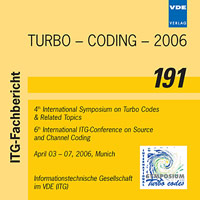Comparison of MIMO Receivers: From APP or MMSE?
Konferenz: TURBO - CODING - 2006 - 4th International Symposium on Turbo Codes & Related Topics; 6th International ITG-Conference on Source and Channel Coding
03.04.2006 - 07.04.2006 in Munich, Germany
Tagungsband: TURBO - CODING - 2006
Seiten: 6Sprache: EnglischTyp: PDF
Persönliche VDE-Mitglieder erhalten auf diesen Artikel 10% Rabatt
Autoren:
Abe, Tetsushi; Bauch, Gerhard (DoCoMo Communications Laboratories Europe GmbH, Germany)
Inhalt:
Reduced-complexity a posteriori probability (APP) and minimum mean-square error (MMSE) with interference cancellation (IC) are two promising techniques to design a receiver for multiple-input and multiple-output (MIMO) systems with spatial multiplexing. An aim of this paper is to clarify which of the two approaches can achieve better performance-complexity trade-off in MIMO/OFDM transmission. For this aim, we conduct a comparison of several MIMO receivers based on these approaches in terms of performance and computational complexity. Computer simulation results show that both approaches lead to similar performance with comparable complexity for QPSK and 16QAM modulation. However, the reduced complexity APP detection structure would be more flexible because its complexity and performance can be adjusted parametrically by varying the number of candidate symbol vectors.


